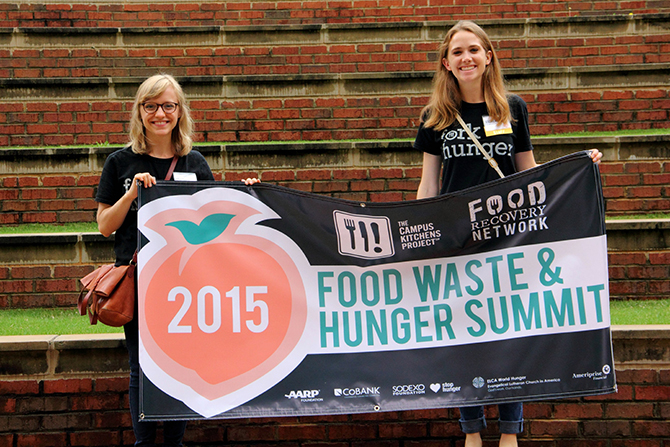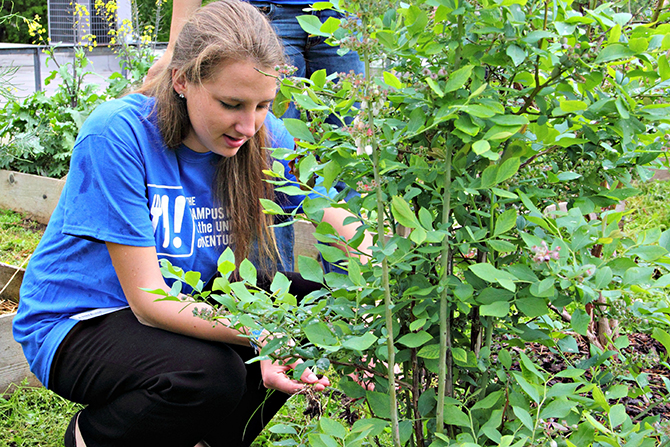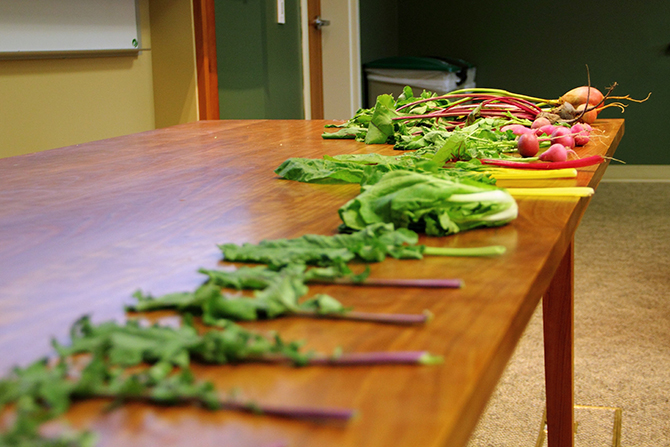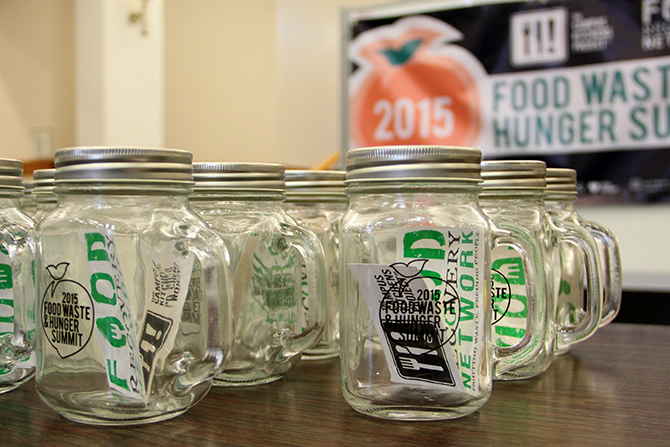It was like I was watching the magic-induced scene from Harry Potter in which every item touched multiplied itself into more pieces. Except, instead of goblets and horcruxes, I was staring at gallons and gallons of milk: whole, skim, 2%, you name it.
This was my reaction last semester when I volunteered for the first time with UGA’s Campus Kitchen chapter. I spent a morning with two other students, visiting grocery stores to gather and repurpose their perfectly good food which for one reason or another was no longer going to be sold on their shelves.

Photo courtesy of Campus Kitchen
After returning to the organization’s freezer and logging and checking the temperatures of the items, the food that once would have been wasted was on its way to being transformed into meals for hungry seniors in Athens.
The seemingly endless gallons of milk (and vegetables and fruits and breads, oh my!) I moved joined the more than 118,000 pounds of food the UGA Campus Kitchen has recovered since their founding in 2012. Which although immense, is only a puzzle piece to the cumulative work of the 45 Campus Kitchens across the country.
Together, these groups have recovered over 4 million pounds of food since the organization was founded. They have done this through activities like the one I participated in, in addition to collecting food which was not perfectly shaped for retail (guys, in real life not all carrots are shaped the same) from fields.

Photo courtesy of Campus Kitchen
On April 18 and 19, all the pieces of Campus Kitchens, including 350 students from across the United States, convened at UGA’s Miller Learning Center for their Food Waste and Hunger Summit which was co-hosted by the Food Recovery Network, a group that focuses on wasted food on college campuses.
From the keynote and plenary session at the summit, it was clear that these passionate food-fighters are kicking butt. They are making a tangible difference for the one in six Americans who find themselves unable to afford food at times.
Here is a sampling of lessons we learned from the Hunger Summit:
1. Hunger is a Problem Too Large for One Solution
For 14 years, Doug Rauch served as the president of Trader Joe’s. He is also the founder of a new organization called Daily Table in Boston which sells expired food and cooked meals at discounted rates in a neat and welcoming environment.
During his keynote address, Rauch said the issue of hunger is bigger than a government solution, that industry won’t take care of it and that non-profits can’t tackle it alone.
“The key is working at this together and not putting ourselves in a silo. We have to share knowledge,” he said.
As one Hunger Summit participant said in answer to why he works with Campus Kitchens, “you can’t enjoy being full when your friends are hungry.”
2. It’s Not Food Waste, It’s Wasted Food

Photo courtesy of Campus Kitchens
“If you really care about food waste, you will never refer to it that way again,” Rauch said. “Words matter, stories matter and narrative matters.”
Rauch explained that we really need to think of it as wasted food, as calling unused items “food waste” makes it sound like second rate or rejected food, which is not the case.
In his talk, Rauch also brought up the fact that what most people see as “expiration dates” on food are really display codes used by producers and distributors. The printed dates are not federally regulated (with the exception of baby food labels) and don’t indicate that something is magically going to make you sick if, say, that cereal box says May 20 but it’s May 22.
Have no fear dorm-dwellers, that bottle of Sriracha is still safe.
3. Hunger and Obesity Are Not Mutually Exclusive
On Sunday morning of the Hunger Summit, UGA College of Family and Consumer Sciences professor Caree Cotwright took the stage and rapped about vegetables.
Yes, she actually rapped about nutrition, and yes, it was fabulous.
Eating good in the neighborhood, and making healthy choices like I know I should! Loving Dr.Cotwright! #HungerSummit pic.twitter.com/l6B1IQaEfI
— FRN UTK (@FoodRecoveryUTK) April 19, 2015
In addition to telling the audience of following her dream to pursue “nutrition theater,” Cotwright discussed how hunger does not always mean a lack of calories. In reality, it often means a lack of proper nutrients. Because of this, people can be both obese and hungry.
If the most accessible and inexpensive food around is at McDonald’s, you can grab a meal and still go home hungry and without proper nutrition. And, as Cotwright, who works in nutrition education with youth, said, a student can’t focus and succeed in school on an empty stomach.
4. College Campuses Can Catalyze Change
Rauch also talked about the importance of meaningful failure. He said, “You won’t achieve anything in your life unless you are willing to fail. Dare greatly and do it with a group of others.” To him, this involves learning from mistakes, balancing risks and rewards, and not trying to rationalize.
“You are the future leaders.” – Dr. Caree Cotwright #preachit #amen #HungerSummit
— Campus Kitchens (@campuskitchens) April 19, 2015
In college, there is room to try new ideas and even to potentially fail. But hey, aren’t we here to learn (and to eat, of course)?
5. Real Solutions Involve the Voices of Those in Need
As the founder of Daily Table, Rauch emphasized the importance of asking the people you are trying to help what they need and want.
He said that long-term hunger fixes, and not just band-aids such as food pantries, should preserve people’s dignity and recognize that for the poor, the issue with healthy food is often a poverty of time. If individuals are working two jobs to make ends meet, chances are they don’t have time to come home after a long day of work and cook.
6. Be the Change You Want to See

Photo courtesy of Campus Kitchen
The Hunger Summit was a relieving antithesis to modern “slacktivism;” they showed their commitment to the cause at each turn. This included making the event zero-waste with composting, reusable mason jars for water, virtual schedules, reusable name tags, and recycling.
If only we could all commit ourselves to throwing away less and doing more.
if you haven’t seen our #hungersummit recap yet, we’re not quite sure what you’re waiting for: https://t.co/6W8WcPEeSU
— Campus Kitchens (@campuskitchens) April 24, 2015


